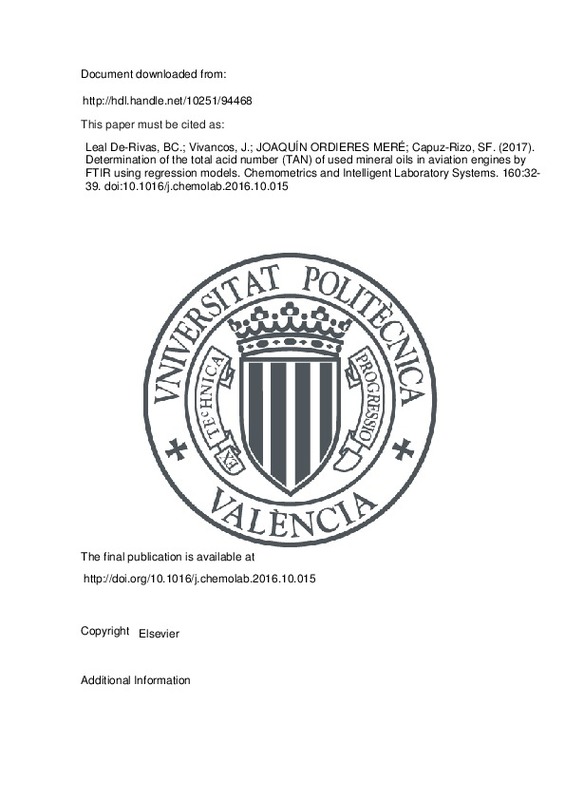JavaScript is disabled for your browser. Some features of this site may not work without it.
Buscar en RiuNet
Listar
Mi cuenta
Estadísticas
Ayuda RiuNet
Admin. UPV
Determination of the total acid number (TAN) of used mineral oils in aviation engines by FTIR using regression models
Mostrar el registro sencillo del ítem
Ficheros en el ítem
| dc.contributor.author | Leal De-Rivas, Beatríz Cecilia
|
es_ES |
| dc.contributor.author | Vivancos, José-Luis
|
es_ES |
| dc.contributor.author | Ordieres Meré, Joaquín
|
es_ES |
| dc.contributor.author | Capuz-Rizo, Salvador F.
|
es_ES |
| dc.date.accessioned | 2018-01-11T09:48:14Z | |
| dc.date.available | 2018-01-11T09:48:14Z | |
| dc.date.issued | 2017 | es_ES |
| dc.identifier.issn | 0169-7439 | es_ES |
| dc.identifier.uri | http://hdl.handle.net/10251/94468 | |
| dc.description.abstract | [EN] Total acid number (TAN) has been considered an important indicator of the oil quality of used oils. TAN is determined by potentiometric titration, which is time-consuming and requires solvent. A more convenient approach to determine TAN is based on infrared (IR) spectral data and multivariate regression models. Predictive models for the determination of TAN using the IR data measured from ashless dispersant oils developed for aviation piston engines (SAE 50) have been developed. Different techniques, including Projection Pursuit Regression (PPR), Partial Least Square, Support Vector Machines, Linear Models and Random Forest (RF), have been used. The used methodology involved a five folder cross validation to derive the best model. Then a full error measure over the whole dataset was taken. A backward variable selection was used and 25 highly relevant variables were extracted. RF provided an acceptable modelling technology with grouped dataset predictions that allowed transformations to be performed that fitted the measured values. A hybrid method considering group of bands as features was used for modelling. An innovative mechanism for wider features selection based on genetic algorithm has been implemented. This method showed better performance than the results obtained using the other methodologies. RMSE and MAE values obtained in the validation were 0.759 and 0.359 for PPR model respectively. | es_ES |
| dc.description.sponsorship | The authors would like to thank Roland Tones of the Universidad Metropolitana for his collaboration in oil sample processing. BLDR acknowledges financial support from the Venoco Company. The authors also thank the Universidad Politecnica de Madrid for granting access to the CESVIMA (http://www.cesvima.upm.es/) HPC infrastructure. We would also like to thank the author Beatriz Leal de Rivas (in memoriam), for her efforts to conform this team of researchers from different areas of expertise, and we want to dedicate this work to her loving memory. | en_EN |
| dc.language | Inglés | es_ES |
| dc.publisher | Elsevier | es_ES |
| dc.relation.ispartof | Chemometrics and Intelligent Laboratory Systems | es_ES |
| dc.rights | Reconocimiento - No comercial - Sin obra derivada (by-nc-nd) | es_ES |
| dc.subject | Aircraft turbine | es_ES |
| dc.subject | Engine oil | es_ES |
| dc.subject | Total acid number (TAN) | es_ES |
| dc.subject | FTIR | es_ES |
| dc.subject | Regression models | es_ES |
| dc.subject.classification | PROYECTOS DE INGENIERIA | es_ES |
| dc.title | Determination of the total acid number (TAN) of used mineral oils in aviation engines by FTIR using regression models | es_ES |
| dc.type | Artículo | es_ES |
| dc.identifier.doi | 10.1016/j.chemolab.2016.10.015 | es_ES |
| dc.rights.accessRights | Abierto | es_ES |
| dc.date.embargoEndDate | 2019-06-16 | es_ES |
| dc.contributor.affiliation | Universitat Politècnica de València. Departamento de Proyectos de Ingeniería - Departament de Projectes d'Enginyeria | es_ES |
| dc.description.bibliographicCitation | Leal De-Rivas, BC.; Vivancos, J.; Ordieres Meré, J.; Capuz-Rizo, SF. (2017). Determination of the total acid number (TAN) of used mineral oils in aviation engines by FTIR using regression models. Chemometrics and Intelligent Laboratory Systems. 160:32-39. doi:10.1016/j.chemolab.2016.10.015 | es_ES |
| dc.description.accrualMethod | S | es_ES |
| dc.relation.publisherversion | http://doi.org/10.1016/j.chemolab.2016.10.015 | es_ES |
| dc.description.upvformatpinicio | 32 | es_ES |
| dc.description.upvformatpfin | 39 | es_ES |
| dc.type.version | info:eu-repo/semantics/publishedVersion | es_ES |
| dc.description.volume | 160 | es_ES |
| dc.relation.pasarela | S\323689 | es_ES |
| dc.contributor.funder | Venoco, Inc. |







![[Cerrado]](/themes/UPV/images/candado.png)

